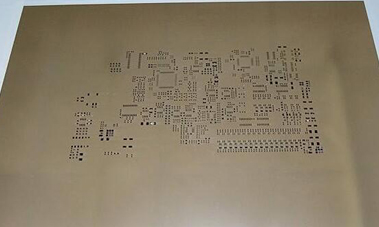Advantages and disadvantages of PCB SMT stencil processing methods
The original SMT stencil manufacturing process was mainly made of photographic plates, and then by chemical etching. Of course, there are laser cutting processing methods or electroforming processing methods for processing SMT steel mesh plates. In the process of continuous production and processing of SMT stencils, it was found that the three processing methods outlined above have their own advantages and disadvantages. The advantages and disadvantages of the three SMT stencil processing methods are compared below:
First, the chemical etching method is the earliest processing method used in SMT stencil processing.
Advantages of the chemical corrosion method: Leak processing of the SMT stencil is performed by chemical corrosion without the need for expensive equipment investment, and the processing cost is relatively low.
Disadvantages of the chemical corrosion method: the corrosion time is too short, the hole wall of the SMT stencil may have sharp corners, and the time may be enlarged, and the side wall corrosion may not make the hole wall smooth. Accuracy cannot be grasped very accurately.
Second, the laser processing method is currently the most commonly used SMT steel mesh processing method, it relies on laser energy to melt the metal, and then cut out the opening in the stainless steel plate.
Advantages of the laser processing method: the processing speed is much faster than the chemical etching method, and the opening size of the stencil is well controlled, especially the added hole wall has a certain taper (tapered about 2 degrees), which is easier to remove mold.
Disadvantages of the laser processing method: When the openings of the SMT stencil are dense, the local high temperature generated by the laser sometimes deforms the adjacent hole wall, and the roughness of the metal hole wall formed by melting is not high, so it is necessary if necessary. Hole wall trimming is required. In addition, the laser processing method increases processing costs by requiring specialized equipment.
The current SMT stencil processing methods are completed by laser cutting. Laser cutting is made using file data, with high accuracy and small tolerances.
Third, electroforming is a process that relies on metal materials (mainly nickel) to continuously accumulate and accumulate to form metal SMT stencils.
Advantages of the electroforming method: The SMT stencil made by the method not only has high opening size accuracy and smooth hole walls, which is conducive to the quantitative distribution of printed solder paste, but also the openings are not easily blocked by the solder paste, thereby reducing the number of times to clean the SMT stencil.
Disadvantages of electroforming: The cost of manufacturing SMT stencils by electroforming is high and the production cycle is long.
Through continuous research and practice, it has been found that whether it is a chemical etching method or a laser cutting method of SMT stencils, there will be opening blockages of varying degrees during printing. SMT stencils need to be cleaned frequently, so the electroforming method has become a thin pin. The main processing method of SMT stencil printing for pitch components solder paste.

